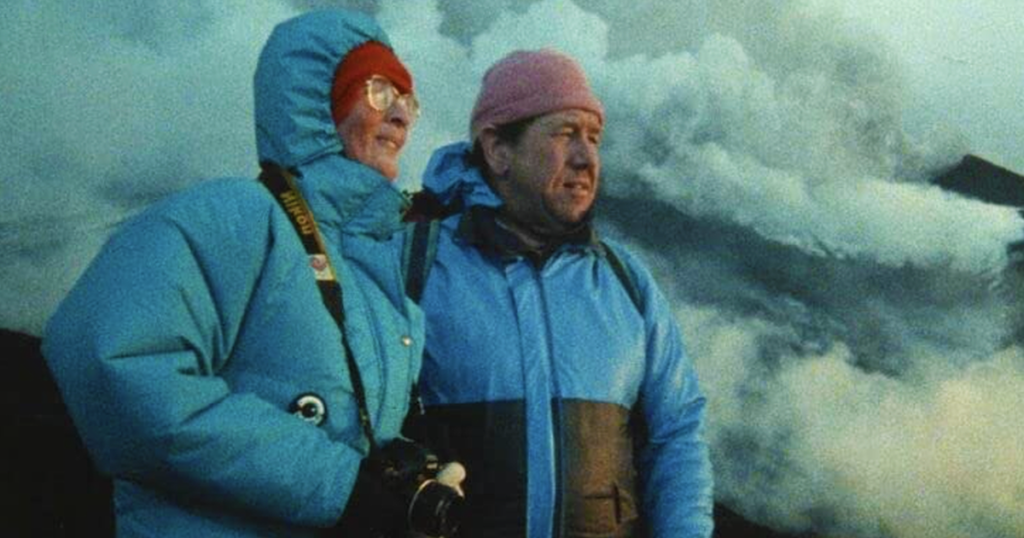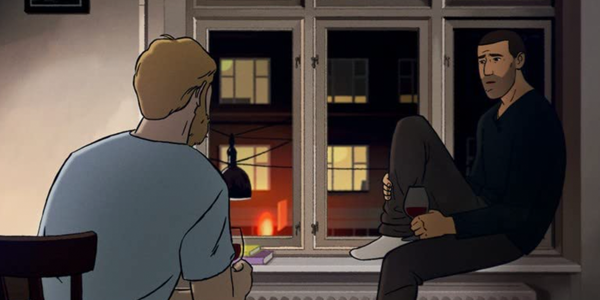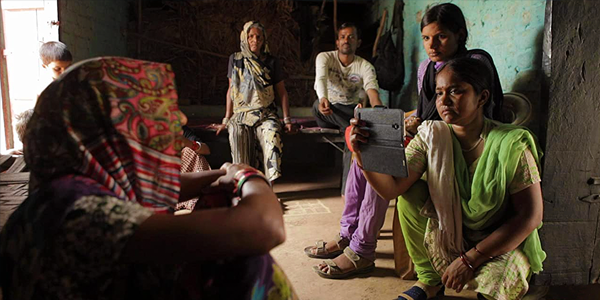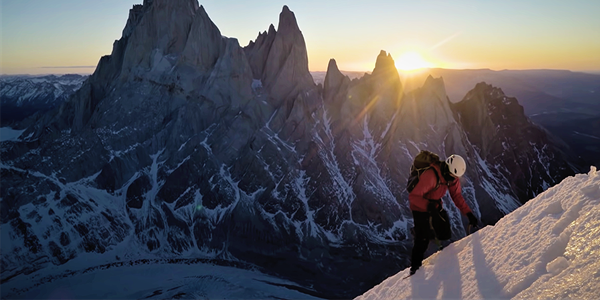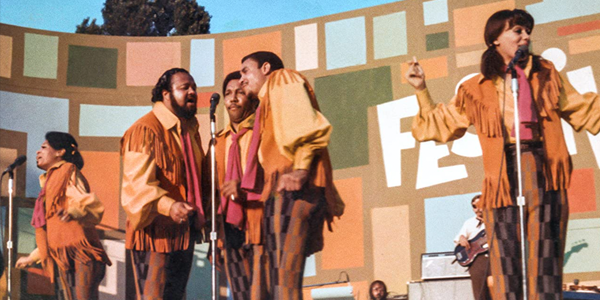ALSO ON CINELUXE
Sign up for our monthly newsletter
to stay up to date on Cineluxe
A quirky but fascinating Oscar-nominated documentary about two quirky but fascinating scientists
by Dennis Burger
February 13, 2023
If you were looking for the perfect person to review Fire of Love, I’d likely be the last person you’d pick. I say that because I watch nature and science documentaries the way some people watch partisan cable news. I visit the National Geographic tab on Disney+ more often than the Disney tab. I already knew the story of Maurice and Katia Krafft, the married volcanologists whose work is the subject of this film. And more than anything else, that’s what puts me at something of a disadvantage here, as getting to know these two is at least half the thrill of Fire of Love.
It does give me something of an advantage, though, too, as it lends me a bit of authority when I say things like this: Director Sara Dosa seems to understand these weird human beings. She gets what made them tick. In digging through hours and hours of archival footage shot by the Kraffts themselves in attempting to tell the story of who they were, she seems to have let them be the guides. And what’s fascinating about that is that it results in a portrait of two nuanced humans who in some ways contradict the stereotypical caricature of what a scientist is and in some ways embody it almost to the point of parody.
As such, the film is a little messy and a lot contradictory, exactly as a biographical snapshot of two people over the course of more than two decades should be. It captures the scientific curiosity of Maurice and Katia so well that at times I couldn’t exorcise from my head Richard Feynman’s humorous comparison between physics and sex: “Sure, it may give some practical results, but that’s not why we do it.” But it also does justice to the passionate mission that evolved out of their curiosity—a desire to understand volcanos so fewer people would be killed by them.
That duality is always bubbling just under the surface of the film, and it’s reflected in a sort of dichotomous tone that defines its style. On the one hand, there’s a reverence here, not merely for the Kraffts but also the work that they did. On the other, there’s an unabashed playfulness that’s reflected in things like the Gilliamesque animation that bridges the gaps in the archival footage and the Wes Anderson-like style that propels the narrative.
Frankly, a lot of the latter comes from narrator Miranda July, whose work on the film is one of the few things I’m not gaga about. I adore July’s writing, and I’ve enjoyed seeing her in other films, but in this one she seems to have been instructed to read the script with a detached hipster aloofness that is out of sorts with the imagery and the words. She reads lines like “Understanding is love’s other name” with the affectation of a stoned-but-bored Aubrey Plaza doing an intentionally half-assed Sarah Vowell impersonation.
Still, even that isn’t enough to rob the film of its power. I think a lesser filmmaker would have let this one fall apart in oh so many ways, especially in trying to deal with Maurice as a sympathetic figure. He is, mind you. The guy was a hoot. But he was also foolhardy and a bit of a showboat. He was the sort of fellow who could sound completely sane and rational while describing a plot to ride an insulated raft inspired by the Gemini spacecraft down a lava flow and into the ocean, no matter how crazy an idea it actually is. He’s the sort of fellow it’s hard not to have a conflicted opinion about. And yet, aside from the obvious editorial choices of what footage to include and what to leave in the archives, Dosa doesn’t seem to impose her opinion at all.
She also shows restraint in another key way I found particularly impressive. Toward the end of the film—and as such, toward the end of their lives—we start to get a sense of Maurice and Katia’s frustration, resulting from a disaster in Colombia that would have been wholly preventable had the local authorities simply listened to the scientists and evacuated the villages surrounding Nevado del Ruiz before it erupted. But the bureaucrats feared the evacuation would be too expensive, and as a result at least 20,000 of the area’s 29,000 residents were killed.
It’s difficult bordering on impossible to watch this without drawing parallels between the work of the Kraffts and that of latter-day climatologists frustratedly attempting to warn us of the impacts of the ongoing climate crisis, and I think most documentarians—especially in this Netflix era of “documentary” filmmaking—wouldn’t have been able to resist the urge to underline those parallels, italicize them, bold them, and rub the viewer’s nose in them. But the script doesn’t even allude to them, leaving the viewer to connect such obvious dots.
It’s that sort of approach that makes this my preferred film about the Kraffts released in the last year—the other being Werner Herzog’s The Fire Within: A Requiem for Katia and Maurice Krafft. Herzog seems to have cleaned up and processed the imagery a bit more than did Dosa, as the bulk of Fire of Love is comprised of unrestored 16mm footage, mostly shot in the 1970s and ’80s in a 4:3 aspect ratio. While a few shots appear duped (perhaps taken from the Kraffts’ numerous films), a lot of it looks to come straight from the camera negative, and as such is fairly clean. But this is still relatively TV-quality imagery that was (mostly) shot more for scientific than entertainment purposes, so it isn’t exactly home theater demo material. All the same, you’ll likely find yourself awed by the subjects of the cinematography and quickly forget issues of detail, color purity, etc.
The 5.1-channel soundtrack, on the other hand, does get a little big for its britches on occasion, trying to add some dynamic zhuzh to footage that doesn’t need zhuzhing. But the all-important dialogue is clear and the hyperactive sound mix doesn’t detract from the story being told.
Of the two documentary films cobbled together last year from footage shot by Maurice and Katia Krafft over the course of their adult lives, Fire of Love is ultimately the better one for a number of reasons. Dosa doesn’t cram her own personality into the film the way Herzog does, but she also takes a more childlike and irreverent approach to the material that I think suits its subjects and its subject matter better. I’d love it if you watched both because there are some ways in which Herzog’s film is superior. But if you have to pick one, make it this one, whether it wins the Oscar or not.
Dennis Burger is an avid Star Wars scholar, Tolkien fanatic, and Corvette enthusiast who somehow also manages to find time for technological passions including high-end audio, home automation, and video gaming. He lives in the armpit of Alabama with his wife Bethany and their four-legged child Bruno, a 75-pound American Staffordshire Terrier who thinks he’s a Pomeranian.
PICTURE | Comprised of unrestored 16mm footage, the documentary is made up of relatively TV-quality imagery shot more for scientific than entertainment purposes, so it isn’t exactly home theater demo material
SOUND | The 5.1-channel soundtrack gets a little big for its britches on occasion, but the all-important dialogue is clear and the hyperactive sound mix doesn’t detract from the story being told
© 2023 Cineluxe LLC


